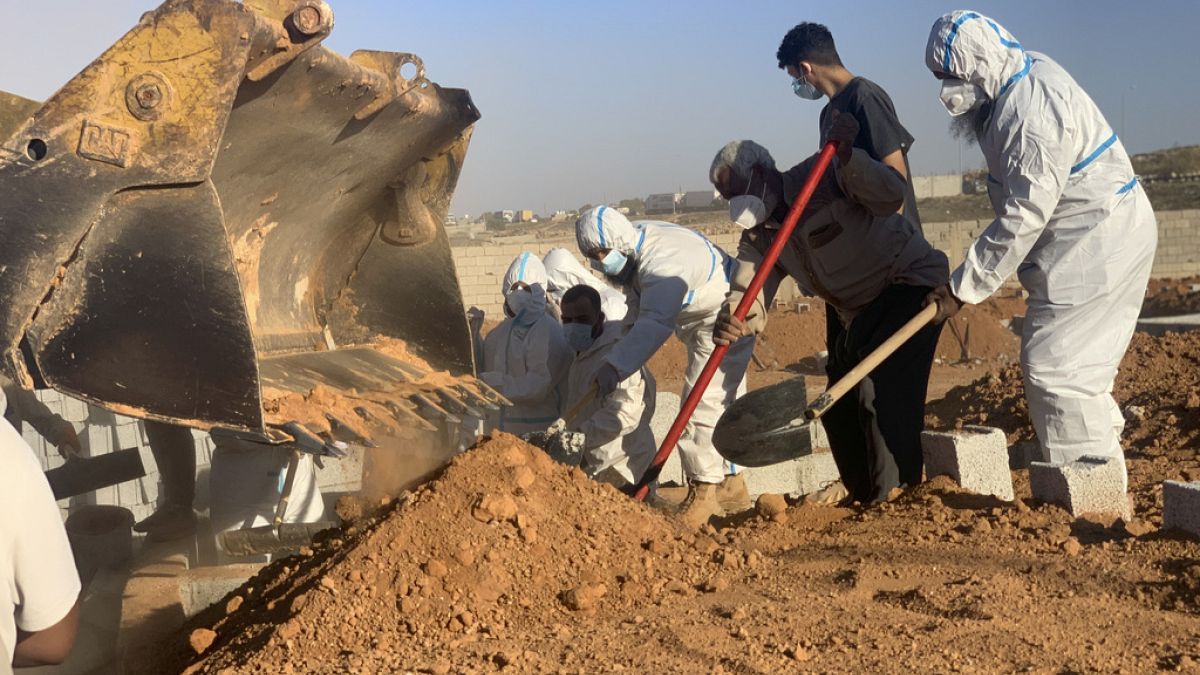Specialist divers are still finding the bodies of people washed out to sea from Derna trapped beneath the water.
A week after a tsunami-sized flash flood devastated the Libyan coastal city of Derna, sweeping thousands to their deaths, the international aid effort to help the grieving survivors slowly gathered pace Sunday.
Search-and-rescue teams wearing face masks and protective suits kept up the grim search for bodies or any survivors in the mud-caked wasteland of smashed buildings, crushed cars and uprooted trees.
Traumatised residents, 30,000 of whom are now homeless in Derna alone, badly need clean water, food, shelter and basic supplies amid a growing risk of cholera, diarrhoea, dehydration and malnutrition, UN agencies warn.
"In this city, every single family has been affected," said one resident, Mohammad al-Dawali.
Another, Mohamed al-Zawi, 25, recounted how he saw "a large mountain of water bringing with it cars, people, belongings... and pouring everything out into the sea".
Amid the chaos, the true death toll remained unknown, with untold numbers swept into the sea.
The health minister of the eastern administration, Othman Abdeljalil, has said 3,283 people were confirmed dead in Derna after another 31 bodies were recovered on Sunday.
Libyan officials and humanitarian organisations have warned, however, that the final toll could be much higher with thousands still missing.
UN Libya envoy Abdoulaye Bathily visited Derna on Saturday, and posted on X, formerly Twitter, that the devastation was "truly heart-wrenching. I saw firsthand the magnitude of the disaster. This crisis is beyond Libya's capacity to manage, it goes beyond politics and borders."
Emergency response teams and aid have been deployed from France, Greece, Iran, Russia, Saudi Arabia, Tunisia, Turkey and the United Arab Emirates, with more on the way from other nations.
Political division
The aid effort has been hampered by the political division of Libya, which plunged into years of war and chaos after a 2011 NATO-backed uprising led to the overthrow and killing of veteran dictator Moamer Kadhafi.
The oil-rich North African country now remains split between two rival governments -- a UN-backed administration in the capital Tripoli, and one based in the disaster-hit east.
The International Organization for Migration's Libya chief Tauhid Pasha posted on X that the aim now was to channel all authorities "to work together, in coordination".
Britain's foreign secretary, James Cleverly, said "the big challenge with Libya" was that it lacks a fully functioning government to coordinate with.
The massive flood came as Libya was lashed on September 10 by the hurricane-strength Storm Daniel, which had earlier brought deadly floods to Greece, Turkey and Bulgaria.
The rapidly rising waters burst two upstream river dams in Derna, sending a late-night tidal wave crashing through the centre of the city of 100,000, sweeping entire residential blocks into the Mediterranean.
UN experts have blamed the high death toll on climatic factors as the Mediterranean region has sweltered under an unusually hot summer, and on the legacy of Libya's war that has depleted its infrastructure, early warning systems and emergency response.
Questions are being asked about whether the disaster could not have been prevented, as cracks in the dams were first reported in 1998.
Bodies on the beach
A week after the disaster, bodies are still washing up on the shore, along with vast amounts of debris.
Hamza Al-Khafifi, 45, a soldier from Benghazi, described to AFP finding the unclothed bodies of "old, young, women, men and children".
"Bodies were stuck between rocks," he said.
A Libyan rescue team in an inflatable boat reported seeing "perhaps 600 bodies" at sea off the Om-al-Briket region, about 20 kilometres east of Derna, according to a video shared on social networks.
The United Nations has launched an aid appeal for more than $71 million.
The aid being sent to Libya includes water, food, tents, blankets, hygiene kits, medicines and emergency surgical supplies as well as heavy machinery to help clear the debris and more body bags.
The scale of the devastation in Derna and surrounding areas has prompted shows of solidarity across divided Libya, as volunteers in Tripoli have collected aid for the flood victims.
The International Committee of the Red Cross has warned that unexploded landmines and other ordnance from the war may have been washed into areas previously free of weapon contamination.
